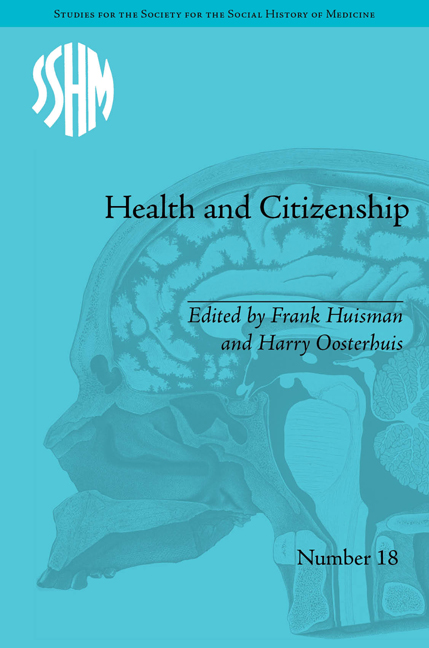Book contents
- Frontmatter
- CONTENTS
- Acknowledgements
- List of Contributors
- The Politics of Health and Citizenship: Historical and Contemporary Perspectives
- Part I Liberal Citizenship and Public Health
- Part II Social Citizenship: Health in the Welfare State
- 5 The Right to Health and Social Citizenship in Germany, 1848–1918
- 6 From Tobacco in the War to the War on Tobacco: Smoking in Britain and Germany from c. 1900 to 1945
- 7 Mental Health and Civic Virtue: Psychiatry, Self-Development and Citizenship in the Netherlands, 1870–2005
- Part III Neo-Republican Citizenship: Health in the Risk Society
- Notes
- Index
7 - Mental Health and Civic Virtue: Psychiatry, Self-Development and Citizenship in the Netherlands, 1870–2005
from Part II - Social Citizenship: Health in the Welfare State
- Frontmatter
- CONTENTS
- Acknowledgements
- List of Contributors
- The Politics of Health and Citizenship: Historical and Contemporary Perspectives
- Part I Liberal Citizenship and Public Health
- Part II Social Citizenship: Health in the Welfare State
- 5 The Right to Health and Social Citizenship in Germany, 1848–1918
- 6 From Tobacco in the War to the War on Tobacco: Smoking in Britain and Germany from c. 1900 to 1945
- 7 Mental Health and Civic Virtue: Psychiatry, Self-Development and Citizenship in the Netherlands, 1870–2005
- Part III Neo-Republican Citizenship: Health in the Risk Society
- Notes
- Index
Summary
As a product of nineteenth-century bourgeois society, psychiatry developed in a dynamic between social-political integration and exclusion. Into the twentieth century, institutional psychiatry fulfilled two functions: a medical one (care and cure), which gave priority to the interests of patients and a social-political one (segregation), which was geared towards freeing society of the nuisance and danger associated with the insane. Of these two, the most prominent function varied depending on a given country' political constellation. From around 1840 various Western European countries adopted legal regulations for the institutionalization of the insane. Within the margins of the constitutional state, these regulations served to protect citizens against random deprivation of freedom and to allow for effective admission procedures to ensure public order as well as medical treatment for mental patients. The hospitalized insane fell under special jurisdiction and state supervision, which implied a suspension of their civic rights. The liberal contract society assumed autonomous individuals who were capable of serving their own rights and interests while respecting those of others. Liberalism linked citizenship to rationality, autonomy and responsibility, which were precisely the qualities mental patients had to do without. Mental incapacity counted in fact as the opposite of citizenship as it had been articulated on the basis of the ideals of freedom and equality since the American and French Revolutions.
- Type
- Chapter
- Information
- Health and CitizenshipPolitical Cultures of Health in Modern Europe, pp. 155 - 172Publisher: Pickering & ChattoFirst published in: 2014



